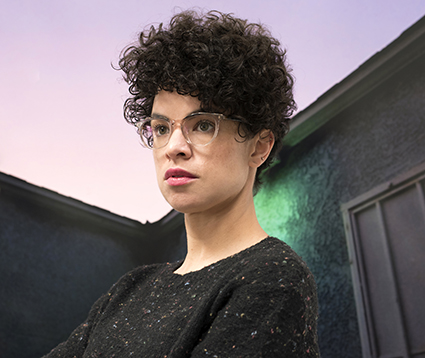Campus News
Institute of the Arts and Sciences kicks off 2019-20 Traction: Art Talks speaker series
‘Traction: Art Talks’ is a twice-quarterly artist speaker series launched by UCSC’s Institute of the Arts and Sciences in 2017. The goal is to introduce students and the public to some of the most important artists working today.



Traction: Art Talks is a twice-quarterly artist speaker series launched by UCSC’s Institute of the Arts and Sciences (IAS) in 2017. The goal is to introduce students and the public to some of the most important artists working today.
The 2019/20 series begins on October 29 with Sadie Barnette, a former artist-in-residence at the Studio Museum in Harlem, who utilizes drawing, photography and large-scale installation to make fantastical the personal, the mundane, and the political. Her recent works use as primary source material a 500-page FBI surveillance file that was kept on her father, Rodney Barnette, who founded the Compton, California, chapter of the Black Panther Party in 1968.
Born and raised in Oakland, Barnette’s work has been exhibited throughout the United States and internationally and is in the permanent collections of museums such as LACMA, Berkeley Art Museum, the California African American Museum, Studio Museum in Harlem, Brooklyn Museum and the Guggenheim. She is also the recipient of Art Matters and Artadia awards and has been featured in The New York Times, The Los Angeles Times, Artforum, and Vogue.
“For the 2019/20 academic year, Traction: Art Talks will feature artists with national and international reputations whose work broadens our understandings of the relationship between art and struggles for social justice,” noted IAS interim director Rachel Nelson.
“All of the IAS programming–whether exhibitions, artist talks, or other events–reflects the conviction that the arts both offer profound insights and can have an impact on the most pressing political, social, and ecological questions of our time,” she added.
Upcoming speakers will include multimedia artist and activist Jackie Sumell on November 5. She will be joined by UCSC feminist studies professor Gina Dent in conversation following her talk.
Sumell’s art is driven by a deep commitment to addressing the abuses of the American criminal justice system, as exemplified by her 11-year collaborative project with the late Herman Wallace, one of the former Angola 3 prisoners, titled The House That Herman Built. The project is the subject of a critically acclaimed documentary film, Herman’s House, that aired on PBS.
Her powerful art project, Solitary Garden, will be on view at UC Santa Cruz from November 5, 2019 to December 6, 2020. The project explores conditions of solitary confinement and the garden will be designed by a person currently in solitary and documented by a UCSC team of collaborators.
The featured speakers for winter quarter will be Pablo Helguera on January 16, 2020 and Walid Raad on March 4.
Born in Mexico City, Helguera is a New York based artist who works with installation, sculpture, photography, drawing, socially engaged art and performance. Coinciding with his Traction: Art Talk, Helguera’s Librería Donceles, an interactive art installation featuring thousands of Spanish language books, will be on display at Santa Cruz Museum of Art and History (MAH) through July 26, 2020.
Helguera’s work focuses on a variety of topics that include history, ethnography, memory and the absurd, which are presented in formats ranging from lectures and exhibitions to musical performances and written fiction. His project, “The School of Panamerican Unrest,” a nomadic think-tank that physically crossed the continent by car from Anchorage, Alaska to Tierra del Fuego, is considered one of the most extensive public art projects on record as well as a pioneering work for the new generation of artworks regarded under the area of socially engaged art.
Helguera has worked since 1991 in a variety of contemporary art museums and was head of public programs at the Education department of the Guggenheim Museum in New York (1998-2005). Since 2007, he has been Director of Adult and Academic programs at the Museum of Modern Art, New York. Hellguera has organized close to 1,000 public events in conjunction with nearly 100 exhibitions.
Walid Raad is an internationally renowned contemporary media artist. His work is informed by his upbringing in Lebanon during the civil war (1975–91), and by the socioeconomic and military policies that have shaped the Middle East in the past few decades.
For The Atlas Group, a 15-year project exploring the contemporary history of Lebanon, he produced fictionalized photographs, videotapes, notebooks, and lectures that related to real events and authentic research in audio, film, and photographic archives in Lebanon and elsewhere. These fictional archives are now held in museums around the world.
Raad’s works have been exhibited at Documenta 11 in Kassel, Germany, The Venice Bennale in Venice, Italy, The Whitney Biennial in New York, and The Ayloul Festival in Beirut, Lebanon, as well as other events and museums throughout North America, Europe, and the Middle East. Raad was awarded a John Simon Guggenheim Memorial Foundation Fellowship in 2009; was selected as a finalist for the 2010 Hugo Boss Prize at the Solomon R. Guggenheim Museum, New York; and was awarded the Hasselblad Foundation International Award in Photography in 2011. He currently lives in New York, where he is an associate professor at the Cooper Union School of Art.
All of the Traction: Art Talks take place at the Digital Arts Research Center (DARC 108) on the UC Santa Cruz campus. Admission is free and open to the public.